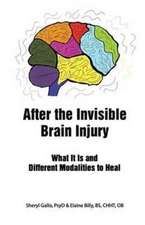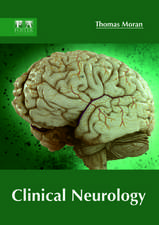Debates About Neuroethics: Perspectives on Its Development, Focus, and Future: Advances in Neuroethics
Editat de Eric Racine, John Aspleren Limba Engleză Paperback – 3 aug 2018
| Toate formatele și edițiile | Preț | Express |
|---|---|---|
| Paperback (1) | 707.71 lei 38-44 zile | |
| Springer International Publishing – 3 aug 2018 | 707.71 lei 38-44 zile | |
| Hardback (1) | 785.72 lei 38-44 zile | |
| Springer International Publishing – 7 iul 2017 | 785.72 lei 38-44 zile |
Preț: 707.71 lei
Preț vechi: 744.95 lei
-5% Nou
Puncte Express: 1062
Preț estimativ în valută:
135.42€ • 139.71$ • 113.01£
135.42€ • 139.71$ • 113.01£
Carte tipărită la comandă
Livrare economică 22-28 martie
Preluare comenzi: 021 569.72.76
Specificații
ISBN-13: 9783319854458
ISBN-10: 3319854453
Pagini: 263
Ilustrații: XIII, 263 p.
Dimensiuni: 155 x 235 mm
Ediția:Softcover reprint of the original 1st ed. 2017
Editura: Springer International Publishing
Colecția Springer
Seria Advances in Neuroethics
Locul publicării:Cham, Switzerland
ISBN-10: 3319854453
Pagini: 263
Ilustrații: XIII, 263 p.
Dimensiuni: 155 x 235 mm
Ediția:Softcover reprint of the original 1st ed. 2017
Editura: Springer International Publishing
Colecția Springer
Seria Advances in Neuroethics
Locul publicării:Cham, Switzerland
Cuprins
History and foundations of neuroethics (What is neuroethics?).- Theories and methodologies in neuroethics (How does neuroethics “work”?).- Training and research programs in neuroethics (How are neuroethicists trained?).- Networking and capacity building in neuroethics (How does neuroethics reach out)?.
Recenzii
“This book explores the development, focus, and future of neuroethics. … intended audience is anyone interested in learning about the study of neuroethics. It will be of interest to academics curious about whether and how the field of neuroethics can be differentiated from ethics and neuroscience. … a useful book for scholars who are interested in orienting themselves to neuroethics as a field distinct from both ethics and neuroscience, or anyone interested in the status and history of neuroethics research.” (Dane S. Muckler, Doody's Book Reviews, October, 2017)
Notă biografică
Dr. Eric Racine is the director of the Neuroethics Research Unit and full research professor at the IRCM (Institut de recherches cliniques de Montréal). He holds other academic appointments at the University of Montreal (Bioethics and Medicine) and McGill University (Neurology and Neurosurgery and Bioethics). Dr. Racine is a pioneer researcher in neuroethics and a prolific author of peer-reviewed papers, chapters and columns published in leading bioethics, neuroscience, social science, and medical journals. His book Pragmatic Neuroethics, was published by MIT Press in 2010 and captures some of his work and views in neuroethics. He has delivered talks and guest lectures to researchers, policy-makers, the general public, and public officials worldwide. His research unit is a hub for the training of international visiting fellows and graduate students, public conferences as well as specialized workshops and seminars. Dr. Racine is a member of the advisory board of the Canadian Institutes of Health Research’s Institute for Neurosciences, Mental Health and Addiction, member of the Dana Alliance for Brain Initiatives, associate editor of the journal Neuroethics, and member of the editorial board of AJOB-Neuroscience. Dr. Racine has been a visiting fellow at the Brocher Foundation in Geneva (Switzerland), at the International Institute of Biomedical Ethics at Uppsala University (Sweden), and the Center for Advanced Studies at the University of Munich (Germany). His research is supported by grants and awards, notably from the Canadian Institutes of Health Research and the Social Sciences and Humanities Research Council of Canada.
John Aspler graduated from McGill University with a BSc in Neuroscience and a minor in Music. Although originally interested in music cognition, his exposure to a stream of problematic neuroscience-related news publications both cultivated and cemented in him an interest in improving the state of science communication. This includesan interest in the potential stigmatization faced by various marginalized communities, related to their media portrayal in health and science writing. At present, John is pursuing a PhD at McGill University and at the Neuroethics Research Unit, where he is working on several projects concerning the media discourse surrounding fetal alcohol spectrum disorder, as well as key stakeholder perspectives about disability and stigma. He has also co-authored articles about the ethics of complementary and alternative medicine in Alzheimer's disease, and has presented his work on FASD at various national and international conferences. In keeping with his interest in science education, he has significant experience lecturing college and undergraduate students about ethics, communication, disability, and critical thinking in science.
John Aspler graduated from McGill University with a BSc in Neuroscience and a minor in Music. Although originally interested in music cognition, his exposure to a stream of problematic neuroscience-related news publications both cultivated and cemented in him an interest in improving the state of science communication. This includesan interest in the potential stigmatization faced by various marginalized communities, related to their media portrayal in health and science writing. At present, John is pursuing a PhD at McGill University and at the Neuroethics Research Unit, where he is working on several projects concerning the media discourse surrounding fetal alcohol spectrum disorder, as well as key stakeholder perspectives about disability and stigma. He has also co-authored articles about the ethics of complementary and alternative medicine in Alzheimer's disease, and has presented his work on FASD at various national and international conferences. In keeping with his interest in science education, he has significant experience lecturing college and undergraduate students about ethics, communication, disability, and critical thinking in science.
Textul de pe ultima copertă
This is the first book entirely dedicated to exploring issues associated with the nature of neuroethics. It reflects on some of the underlying assumptions in neuroethics, and the implications of those assumptions with respect to training and education programs, research activities, policy engagement, public discourse, teaching, ethics consultation and mentoring, to name but a few areas of interest. Internationally respected and emerging leaders in the area have taken up the pen to express and debate their views about the development, focus and future of neuroethics. They share their analyses and make recommendations regarding how neuroscience could more effectively explore and tackle its philosophical, ethical, and societal implications.
Caracteristici
Provides discussions about the development, focus, and future of neuroethics Identifies the strengths and weaknesses of this controversial field Includes methodologies, theories, training programs, and networks Includes supplementary material: sn.pub/extras





































